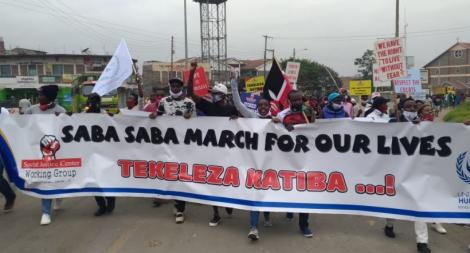The 7th day of July commonly referred by Kenyans as “Saba Saba Day” signifies defiance to oppressive regime in our country. Thirty years ago, Saba Saba day witnessed nationwide protests against the one party regime led by the then President of the Republic of Kenya, Daniel Toroitich Arap Moi. Most of the organisers at the frontline in the first Saba Saba protests have since passed away or joined politics.
Over the years, the civil society has played an active role in organizing Saba Saba protests. While the first Saba Saba protest conducted in the year 1990 was about demanding for political pluralism, the protest is currently used as a platform to mobilize and demand for justice for victims of human rights violations and also call for the full implementation of the Constitution of Kenya 2010. The Saba Saba protests now take different forms including marches accompanied by active lobbying and advocacy on social media. This year (2020), the Saba Saba Day protests were organized by grassroots human rights defenders through the Social Justice Centre Working Groups.
The Saba Saba protests were conducted in line with Article 37 of the Constitution of Kenya which guarantees every person the right, peaceably and unarmed, to assemble, to demonstrate, to picket and to present petitions to public authorities. Ironically, the protestors who marched peacefully while carrying their placards were arrested shortly after the protest began.
The police used excess force and teargas to disperse peaceful protestors and arrested some of them. At a time where we are grappling with the COVID-19 pandemic, the use of teargas and further putting protestors in a cell together was not only a violation of their rights to peacefully protest but also a health risk as they could potentially contract Covid-19 while being held up in the police cells.
When our representatives arrived at Kayole Police station where some protestors were being held, the protestors had not yet had any charges preferred against them contrary to the Constitution of Kenya, 2010. Article 49(1)(h) of the Constitution is clear that an arrested person has the right to inter alia, be released on bond or bail, on reasonable conditions pending a charge or trial, unless there are compelling reasons not to be released. It is in this regard that we were able to ask that the protestors be charged and/or released on bond or bail accordingly so that we could then accord them the necessary legal aid.
The protesters were released on a cash bail of Kshs.5, 000.00 as they awaited for charges to be preferred against them. Unfortunately, no charges have been preferred against those who were arrested on the material day to date. It is important to note that the expression of the right to liberty in Article 3 of the Universal Declaration of Human Rights (UDHR) reflects the inalienable nature of that right. The common conception of liberty formed the basis for the later articulation of the right to liberty in Article 9 of the International Covenant on Civil and Political Rights (ICCPR). Article 9(1) of the ICCPR prohibits arbitrary arrest and detention. Article 49(1) of the Constitution of Kenya is equivalent to Article 9(2) of the ICCPR and these provisions emanate from the famous United States Supreme Court Case of Miranda vs Arizona.
In our work with communities, we have noted that in addition to limited access to the justice system, many Kenyans are still not aware of their rights as guaranteed in the Constitution of Kenya 2010. The inadequate knowledge or lack thereof of the law continues to pose great challenges for the entire justice system as victims of human rights violations are sometimes not willing to pursue the formal legal system.
Through our Legal Advocacy and Community Outreach department, KM Advocates provided legal aid to the protestors who were arrested during the Saba Saba day rally 2020. In Kenya, access to justice is perceived as a preserve for the rich as many citizens cannot afford the services of a lawyer should they need one. In cases where they can access legal aid, it is not consistent as most of the legal aid programs are donor funded.
We believe that justice should be accorded to everyone, which is why in addition to private practice, we engage in partnerships to provide legal aid clinics and undertake Public Interest Litigation where possible, as part of our Corporate Social Responsibility (CSR).
Even though Saba Saba Day is only commemorated on one day, the spirit of Saba Saba to demand for the protection of our Constitution continues every day. You can witness it through emerging human rights defenders within the community as well as the willingness by the Judiciary, the Office of the Director of Public Prosecutions and the Law Society of Kenya to ensure that the Rule of law is upheld at all costs.
Indeed, justice is a collective responsibility that requires a people-centered approach. Justice has to be centered on the people it is supposed to serve. For us to have justice systems that work, we need to acknowledge the key role that the legal practice holds in providing counsel to victims as well as the accused. We must all seek to protect the Constitution of Kenya as it is the basis of our democracy and its full implementation is a corner stone for sustainable development in Kenya.
The writer engages in independent public policy analysis.
For more information or clarification kindly contact [email protected]
Disclaimer: This article is meant for general use only and should not be relied upon solely without seeking legal advice first.


Recent Comments